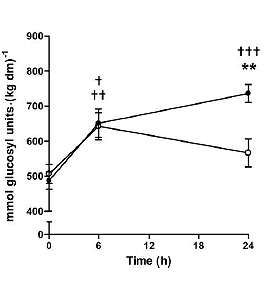|
Definition: "An ergogenic aid is any substance or phenomenon that enhances performance "
|
|
||||||||
06.05.2009 |
|
|
Fat burner carnitine needs carbohydrates
Going by what's written in physiology textbooks, you'd think that L-carnitine [structure below] would be a fantastic supplement. Carnitine is responsible for fat burning in muscles. Give people extra carnitine, and they lose weight and gain more stamina. You would think. The problem is, though, that in many studies carnitine has no effect at all. British researchers discovered why this is – and when carnitine does work.
According to some studies [of which a suspiciously high number were paid for by the supplements industry], taking carnitine has an effect. Centenarians for example have more muscle tissue and less fat if they take carnitine supplements. The sex lives of men over sixty supposedly improve more from carnitine supplements than from oral testosterone. [Urology. 2004 Apr;63(4):641-6.]
All great stories, but according to many other studies, carnitine has no effect at all. If you give the stuff to overweight women who do fitness and want to lose weight, they don't lose a gram extra. [Int J Sport Nutr Exerc Metab. 2000 Jun;10(2):199-207.] The reason for this, sports scientists agree, is because carnitine supplements do not raise the carnitine concentration in the muscles of healthy adult humans. Physical exercise is what does this, according to animal studies.
The white bars in the chart below show what happened to the amount of carnitine when the men were give a small amount of insulin and glucose. The black bars represent what happens when the subjects were given much higher amounts of insulin. The figure comes from a review article. [J Physiol. 2007 Jun 1;581(Pt 2):431-44.]
When carnitine is taken as a supplement, the amount of carnitine in the muscles increases more, the more insulin there is circulating in the body. This suggests that carnitine probably works best if you take it together with a well-balanced meal which causes the sugar and insulin levels to rise.
The recent British study is of interest primarily to endurance athletes, and of less interest to power athletes and weight watchers. We draw this conclusion from the graph below.
This shows the concentration of glycogen in the muscles. The curve with the transparent circles represents the men who were given a salt solution, insulin and glucose. The curve with the black circles represents the men who were given carnitine, insulin and glucose.
The muscles of those who took carnitine stored thirty percent more glycogen. That's because the muscle cells burned more sugars – and more fats. The amount of lactic acid in the muscles – a marker for carbohydrate burning – decreased by forty percent.
If endurance athletes load up on carbohydrates before a race, carnitine supplements might help, you could conclude from the study. And maybe the same is true for bodybuilders who want to give their muscles a glycogen boost before a competition.
But we need to be a little careful here. Not only because administering a supplement intravenously is different from adding it to food, but also because the project leader for this research is on the payroll of Lonza, a carnitine manufacturer.
Sigh, deep, deep sigh...
Source:
More:
|
|



